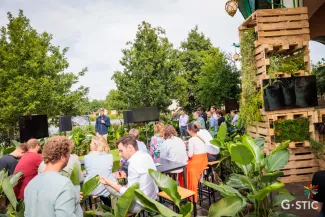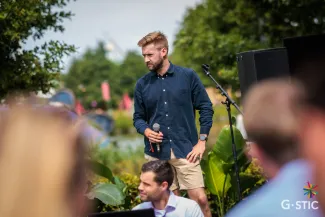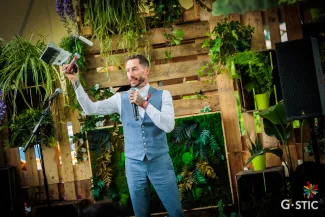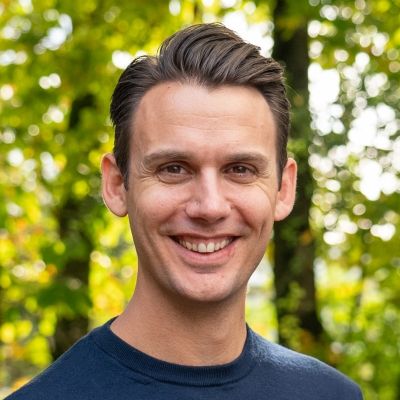With VITO4STARTERS, VITO is positioning itself amid the start-up ecosystem
This year, there will be not one, but two editions of VITO4STARTERS, whereby VITO is aiming to get start-ups working around sustainability a leg up. On 19 March, the competition will descend upon Hasselt, where the final will be held during the Flanders Technology & Innovation Festival. And on 25 July, VITO4STARTERS – now part of the furniture – will again have a presence at Love Tomorrow in Boom.

Aan start-ups die met innovatieve ideeën en technologieën willen bijdragen aan een meer duurzame economie en samenleving, is er geen gebrek. Dat blijkt onder meer uit de grote interesse voor VITO4STARTERS, de wedstrijd die VITO in 2022 in het leven riep en waarmee het start-ups wil helpen in de realisatie van hun duurzame ambities. De winnaars van de edities van 2022 en 2023 ontvingen elk technologische ondersteuning van VITO. ‘We merken dat er erg veel interesse is voor onze wedstrijd’, zegt Nils Wuytens van VITO. ‘Daarom hebben we besloten om in 2024 minstens twee edities te organiseren.’
Focus on urban environment
The next edition of VITO4STARTERS will take place on 19 March in Hasselt at the Corda Campus. It is part of the Flanders Technology & Innovation Festival there, which will be travelling through Flanders that week. Whereas the fields in which the participating start-ups work are normally wide-ranging (sustainability is a broad concept), the focus in Hasselt will be on a sustainable urban environment. Wuytens: ‘Start-ups taking part in this edition are working on of these five themes: circularity, energy, food, mobility and urban culture.’ In taking part, the new companies are competing for support from VITO (both technology and expertise) to stimulate and accelerate the development of their business. Something else new about this VITO4STARTERS edition is that European start-ups can also take part. ‘Sustainability does not end at our national borders. That means innovative start-ups from abroad are also very welcome.’ This edition's winner will receive VITO's support to the tune of 25,000 euros.
This year's second edition of VITO4STARTERS will then be held on 25 July. For the third time, the final will take place in the beautiful setting of Love Tomorrow in Boom, which as it happens VITO also co-founded. But compared to the two previous editions, it will actually be a bit different this time. ‘This year, it's going to be bigger, better, bolder,’ is the way Wuytens announces it. ‘For example, after the competition, we'll be supporting more start-ups among the entrepreneurs than just the winner.’
In fact, this had already happened with the runners-up from 2022 and 2023 – the start-ups who placed second in these editions of VITO4STARTERS. These were GrO2 and Clean Water Global respectively (see below). Both companies have since received VITO support already.
Accelerator for Tech Transfer
The changes for VITO4STARTERS are part of VITO's ambition to further enhance its start-up operation. ‘We want an even greater focus on guiding start-ups,’ Wuytens continues. ‘That's why we're also expanding the team at our Tech Transfer Office.’ The start-up operation is of strategic importance to VITO too. ‘We often create start-ups at VITO ourselves too, in the form of spin-offs. That involves numerous challenges, such as finding funding. With VITO4STARTERS, we're positioning ourselves amid the start-up ecosystem, both here in Flanders Belgium, and in Europe. This provides a valuable network that we can fall back on, for example when searching for venture capital.’
In that sense, VITO4STARTERS could be viewed as an accelerator for the Tech Transfer at VITO. ‘Some great synergies can arise from collaborations with start-ups, which will last for the long term and might even produce some new patents, for example,’ says Wuytens. ‘This is a welcome addidtion to the traditional research context. Thanks to these collaborations, we gain a better view of what's going on in the market, to which our people can then respond. That creates a fruitful cross-fertilisation.’

Growing micro-algae with the aid of industrial residual heat
Micro-algae are single-celled organisms that convert CO2 into oxygen and biomass using light – useful for numerous applications. However, the production of micro-algae is not yet sustainable enough for this to be used at large scales.
For his master's dissertation at the University of Antwerp, Arthur Boven from Mol conceived a way of using industrial residual heat for the production of micro-algae. With this free thermal energy, the micro-algae can grow at an optimum temperature.
Boven developed a 'photo-bioreactor' that can be fitted to the roofs of industrial buildings, where there is sufficient light for the micro-algae in the reactor. As it happens, he received support from VLAIO (Innovative Starter Support) for this. Moreover, Boven developed a unique control system for the interior climate in the reactor, so the algae growth always remains optimum.
There is presently a test reactor at VITO – a synergy that makes sense, as VITO is also conducting research into micro-algae. ‘Thanks to VITO4STARTERS, I got the chance to develop my project at VITO's site in Mol,’ says Boven. ‘We want to start using residual heat originating from the geothermal energy plant for growing micro-algae. I'm allowed to use VITO equipment for this, such as a device for reusing water during the algae growth that was developed by VITO itself. Alongside that, I can always call upon the knowledge and expertise of experienced researchers.’ Since late last year, students from the University of Antwerp – Boven's alma mater – have also been taking part in the further development of the photo-bioreactor.

A sustainable solution for paint rinse water
A painting job only ends once all the paintbrushes have been cleaned. This is generally done in water, which dissolves the paint. This water then often ends up in the drainage, then thus in the sewer. That, however, is not sustainable, as the paint substances make water purification more difficult and may also be toxic to people and the environment. The paint water actually needs to be collected as small hazardous waste, for example at a container park. But – certainly for professional painters – this is not very practical.
Seven years ago, Timmy Bours from Neeroeteren decided things needed to change. He focused himself entirely on the problem and sought out a sustainable solution. This led to the launch of the start-up Clean Water Global, which is active in Belgium and the Netherlands. ‘We developed a collection system whereby painters could deposit their paint rinse water in containers (“Depositos”) specially designed by us, which we come and collect,’ says Bours. ‘It's sort of comparable to the Recupel equipment recycling contribution system for discarded electronics.’
At Clean Global Water, the paint rinse water is then purified, with the solid substances separated. ‘Furthermore, new products can be made from that as well,’ says Bours. ‘Last year, in a test campaign, we collected forty thousand litres of rinse water from eighty painters. We were able to recover over six tons of paint from that. So there's a great economic opportunity waiting in the wings from this recovery.’
Along with several experts from VITO, Bours examined how his solution could be further improved and made more efficient. And what applications certain recovered raw materials could have.



